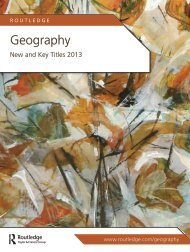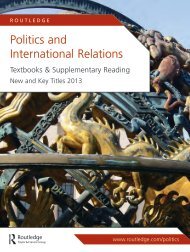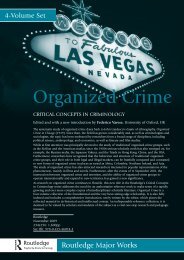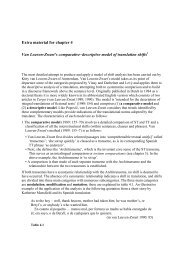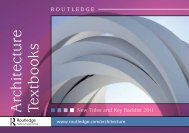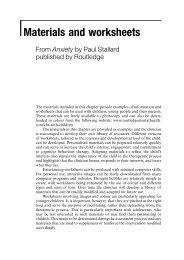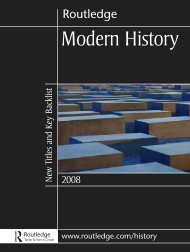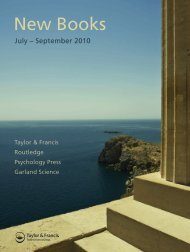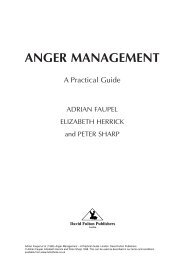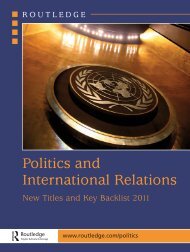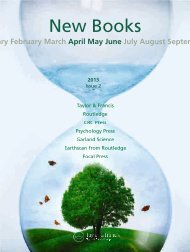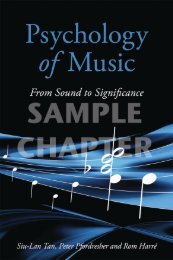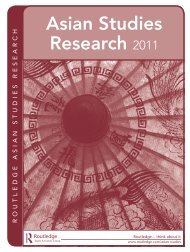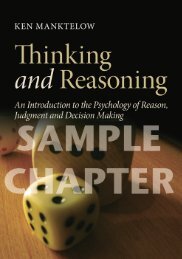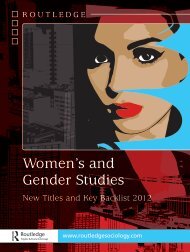Tim Burton: The Monster and the Crowd - A Post-Jungian Perspective
Tim Burton: The Monster and the Crowd - A Post-Jungian Perspective
Tim Burton: The Monster and the Crowd - A Post-Jungian Perspective
Create successful ePaper yourself
Turn your PDF publications into a flip-book with our unique Google optimized e-Paper software.
28 Introduction<br />
<strong>and</strong> mysteries. [. . .] Prome<strong>the</strong>us <strong>the</strong> stealer of ®re, Heracles <strong>the</strong> dragon<br />
slayer, <strong>the</strong> countless creation myths, <strong>the</strong> fall from paradise, <strong>the</strong> mysteries<br />
of creation, <strong>the</strong> virgin birth, <strong>the</strong> treacherous betrayal of <strong>the</strong> hero,<br />
<strong>the</strong> dismembering of Osiris, <strong>and</strong> many o<strong>the</strong>r myths <strong>and</strong> fairy tales<br />
represent psychic processes in symbolic images. Similarly, <strong>the</strong> ®gures of<br />
<strong>the</strong> snake, <strong>the</strong> ®sh, <strong>the</strong> sphinx, <strong>the</strong> helpful animals, <strong>the</strong> Tree of <strong>the</strong><br />
World, <strong>the</strong> Great Mo<strong>the</strong>r, <strong>the</strong> enchanted prince, <strong>the</strong> puer aeternus, <strong>the</strong><br />
Mage, <strong>the</strong> Wise Man, Paradise, etc., st<strong>and</strong> for certain motifs <strong>and</strong><br />
contents of <strong>the</strong> collective unconscious.<br />
(Jacobi, 1973: 47)<br />
In man's psychic life <strong>the</strong> archetypes are part of what Jung called `<strong>the</strong><br />
individuation process', or simply `individuation'. Jol<strong>and</strong>e Jacobi, a ®rstgeneration<br />
follower of Jung, de®nes this process as gradual self-ful®lment,<br />
self-realisation `both in <strong>the</strong> individual <strong>and</strong> . . . in <strong>the</strong> collective sense' (Jacobi,<br />
1973: 106). In o<strong>the</strong>r words, individuation is personal development which<br />
leads towards psychic wholeness ± `when both parts of <strong>the</strong> total psyche,<br />
consciousness <strong>and</strong> <strong>the</strong> unconscious, are linked toge<strong>the</strong>r in a living relation'.<br />
<strong>The</strong> complete union of <strong>the</strong> two psychic systems is an unattainable goal, but<br />
<strong>the</strong> good news is that relative differentiation is possible (1973: 105).<br />
In his book Human Being Human (2005) Christopher Hauke provides a<br />
contemporary outlook on <strong>the</strong> individuation process. He de®nes individuation<br />
as `<strong>the</strong> urge found in all living things to persist in becoming <strong>the</strong>mselves;<br />
in human terms this means <strong>the</strong> development of <strong>the</strong> individual personality<br />
<strong>and</strong> becoming <strong>the</strong> person you were meant to be or <strong>the</strong> person you have<br />
always had <strong>the</strong> potential of being. [. . .] It lies at <strong>the</strong> core of what I mean by<br />
human being human' (Hauke, 2005: 65). <strong>The</strong> important point is that <strong>the</strong><br />
individuation process implies, to some extent, a con¯ict with society,<br />
because, in becoming an individual, one may start questioning collective<br />
norms <strong>and</strong> traditions. <strong>The</strong> differentiation of <strong>the</strong> personality, Christopher<br />
Hauke writes, `is not only <strong>the</strong> differentiation of unconscious from conscious<br />
contents but <strong>the</strong> fur<strong>the</strong>r differentiation of <strong>the</strong> personal unconscious from<br />
<strong>the</strong> collective' (2005: 65). We will come back to this point in later chapters<br />
when discussing <strong>Burton</strong>'s characters' relationship with society, <strong>and</strong> <strong>the</strong>ir<br />
blatant refusal to comply with <strong>the</strong> collective norms.<br />
<strong>Burton</strong> tends to create heroes who do not want to abide by any rules but<br />
<strong>the</strong>ir own. <strong>The</strong>y feel that rules do not exist a priori but are always laid out by<br />
a person, or people, who currently have <strong>the</strong> power to create spoken or<br />
written legislation in a particular community or group. <strong>Burton</strong>'s protagonists<br />
refuse to accept <strong>the</strong> `of®cial' version of <strong>the</strong> world; <strong>the</strong>y constantly<br />
`defamiliarise' <strong>the</strong> of®cial picture, make it different, strange, `uglily creative'.<br />
Looking at <strong>the</strong> world through magic binoculars, <strong>the</strong>y can notice things o<strong>the</strong>r<br />
people cannot see. <strong>Burton</strong> once said about his own perception of <strong>the</strong> outside<br />
world: `When you are a kid, you think everything is strange, <strong>and</strong> you think it<br />
http://www.jungarena.com/tim-burton-<strong>the</strong>-monster-<strong>and</strong>-<strong>the</strong>-crowd-9780415489713



